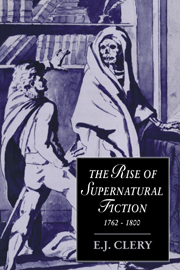Book contents
- Frontmatter
- Contents
- List of illustrations
- Acknowledgements
- Introduction
- PART I TECHNIQUES OF GHOST-SEEING
- PART II THE BUSINESS OF ROMANCE
- PART III THE STRANGE LUXURY OF ARTIFICIAL TERROR
- PART IV MAGICO-POLITICAL TALES
- 9 The terrorist system
- 10 Conspiracy, subversion, supernaturalism
- Afterword
- Notes
- Bibliography
- Index
- CAMBRIDGE STUDIES IN ROMANTICISM
9 - The terrorist system
Published online by Cambridge University Press: 03 December 2009
- Frontmatter
- Contents
- List of illustrations
- Acknowledgements
- Introduction
- PART I TECHNIQUES OF GHOST-SEEING
- PART II THE BUSINESS OF ROMANCE
- PART III THE STRANGE LUXURY OF ARTIFICIAL TERROR
- PART IV MAGICO-POLITICAL TALES
- 9 The terrorist system
- 10 Conspiracy, subversion, supernaturalism
- Afterword
- Notes
- Bibliography
- Index
- CAMBRIDGE STUDIES IN ROMANTICISM
Summary
In the novels of Radcliffe and others of her school, supernatural suggestions are typically formed in the heroine's imagination like an imprint of the arbitrary excesses of patriarchy. They bring into effect a passing denaturalisation of ‘natural’ authority. But there are other moments when, instead of manifesting authority, invisible forces, concealed from the gaze of the tyrant, seem capable of eluding and thwarting him, forming a kind of alliance with the embattled heroine. In The Mysteries of Udolpho the dictates of Montoni are exposed to doubt and ridicule by a ghostly echoing voice. Radcliffe reused the device for the Inquisition scenes of The Italian, in which an unknown and unseen interrogator interrupts the trial of the hero, and undermines the protocol of the court: ‘“Who is come amongst us?” said the vicar general, in the voice of a person, who means to inspire in others the awe he himself suffers.’
Invisibility and abstraction are natural weapons of resistance against the arbitrary power of state or sovereign. Thus, Montesquieu explains that bills of exchange, the first paper money, were the invention of the Jews, who were in constant danger of having their wealth confiscated by the ruling power. In the course of time this ghost money served to transgress national boundaries, shifting the balance of economic power from royal house and the aristocratic caste, with their immobile landed inheritances, to the cosmopolitan trading classes. But, once dominant, the capitalist economy develops in turn its own bugbears: poachers, pirates, highwaymen, smugglers, invisible and unacknowledged agents of the growth and spread of luxury.
- Type
- Chapter
- Information
- The Rise of Supernatural Fiction, 1762–1800 , pp. 133 - 155Publisher: Cambridge University PressPrint publication year: 1995

